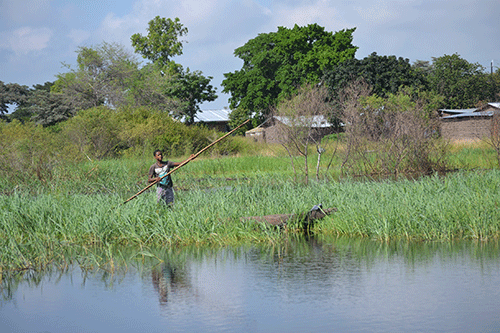Just as flood victims in the Kabbe flood-prone areas of the Zambezi region prepare to resume their daily lives, the rapid rise of the Zambezi River has villagers and officials fearing a potential second wave.
Thousands of villagers in the Kabbe South constituency were cut off from essential services such as health, schools and other basic amenities when the river rose to a depth of six metres earlier this year. The heavy flooding inundated the region in early February after good rains in the surrounding catchment areas.
Over time, the flood waters, which negatively affected the livelihoods of the residents, started subsiding. That was until about a week ago when reports of the river rising again rapidly surfaced.
Zambezi governor Lawrence Sampofu on Monday confirmed that the river is rising.
“Just when we thought the river was going down, it started rising again since last week. It stood at 3.92 metres by 20 April, and now it’s standing at 4.25m. We fear for a second wave as the river continues rising rapidly,” he noted.
At least nine schools in the flood-prone Kabbe area have been immersed by heavy flooding, leaving learners and teachers fearing drowning or snake bites as the cold-blooded reptiles inhabit swampy fields around the schools.
The affected schools include Namiyundu, Nankuntwe, Mpukano, Muzii, Kasika, Mbalasinte, Ivilivinzi, Ikaba and Nsundwa.
Lack of transport, the presence of deadly snakes, and a lack of accommodation for learners and teachers are some of the challenges highlighted by the school communities in these areas.
Kabbe South councillor John Likando also confirmed the rising Zambezi River.
“Strangely, the river is rising again. Some people were even planning to move their livestock back from higher grounds, seeing that the water was going down. We suspect and fear a second wave,” Likando reacted.
Kabbe is frequently affected by flooding as it is situated on low-lying land, which is only two to five metres above sea level.
The Zambezi regional disaster risk management unit recently called on relevant actors to provide urgent humanitarian aid in the form of tents, food items, mattresses, life jackets, boat engines and fuel, snake repellents, mobile clinics, mosquito nets as well as disinfectants for toilets and pit latrines.
These were some of the urgent needs identified by the disaster risk management team with education and health officials, following an assessment of nine schools which have been negatively affected by floods in both the Kabbe South and North constituencies.
However, the disaster management team, in consultation with school management and community members, jointly agreed that all school activities should continue. Their reasoning is that all schools still have enough dry space.
The team indicated that for a total of 1 603 learners with 122 staff members of the nine affected schools, an amount of more than N$12 million is needed for food items to cater to the affected schools.
Meanwhile, a total of 148 tents, with 1 539 mattresses, are urgently needed as learners currently sleep on the floor. As such, they are exposed to dangerous creatures such as snakes, crocodiles and hippos.
The team further determined that at most schools, the water quality was reported to be of a poor standard. This is despite the water supply system being sufficient to cater for both the schools and the community hostels.
In addition, while some schools have sufficient ablution facilities (flushing toilets and pit latrines), the septic tanks of the facilities are currently full, which severely limits their usage. As a consequence, both learners and staff are often forced to relieve themselves out in the open, thereby exposing them to dangerous animals, particularly at night.
Other learners have since relocated from their homes, and are currently residing in a community hostel consisting of mud structures and tents. At many schools, it was observed that the learners sleep on the bare floor without any mattresses, and with poor or non-existent bedding. anakale@nepc.com.na
Pic: Zambezi River
Caption:


